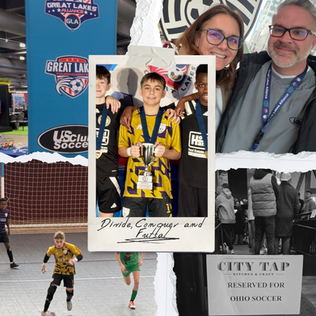Stop Sideline Coaching
- Jennifer Dunaway

- Jul 17, 2019
- 3 min read
Updated: Dec 18, 2021
I am a recovering sideline coach.
I started coaching from the sideline around 2010, I started off like most of us do by screaming nonsense at my 3 year old as he tripped over the ball dribbling in a swarm during little dribblers. This was obviously just a gateway into the harder stuff SAY soccer and then eventually club. My whole family suffered from my sideline coaching for 8 long years. I was in such denial about my problem that I thought it was funny when my 9 year old would yell back at me from the field but our frustration would mount into a blow-up in the car on the way home.
What I found was that my son was getting so frustrated with me getting frustrated with him that before he even got to the car whether he had won or lost he was miserable. He had a million disruptive thoughts in his brain and was just waiting for me to crush him with my opinions too.
A year ago we began to have the opportunity to work with a coach that made it clear in no uncertain terms that sideline coaching was not allowed. No. Sideline. Instruction. At. All.
Nothing. Not "Pass!" Not "Shoot!" Not "Switch it!" Not even, "Throw it in fast". No instruction.

This was hard, even impossible for someone like me. I still back slide, a lot. Even with just 90% less sideline coaching I see a significant difference in my player and I see a significant difference in myself and how I feel.
While there are a million different reasons not to coach from the sideline there are 3 major ones that I hope will encourage you to stop right away.
3 Reasons to Stop Sideline Coaching Now!
1. Trust your coach. If you don't trust your player's coach then you are in the wrong program. Period. You should be able to trust that your coach has a developmentally significant reason for your team's style of play, formation and strategy. You should be able to trust that your player (and all of the other players on the field for that matter) are in a position that your coach believes will contribute to their overall development.
2. Trust your player. Being shouted at the same thing over and over again by anyone sends a clear message that you are not trusted. You are not trusted to remember what to do or how to do it. By continuing to scream directions at an individual player you are telling them and everyone around them that you do not believe they are capable of doing what is "right" You take away all of their freedom for creativity and problem solving and you are building within them and yourself mounting frustration.
3. You don't know what you are saying. Sorry, not sorry but you don't have a clue. You don't know what tweaks and changes your coach has made for this competition. You don't know what player development topics your coach is focusing on. You don't know what research your coach has done on the competition. You don't know if your coach wants your forwards to press or you full backs to hold a high line. You don't know if he wants that free kick on frame or in the air for a finish. You don't know. Everything you are saying big or small could be contradicting your coach (Please see #1).
I've found that recently my player comes off the field a totally different kid. Maybe its maturity, maybe its that he has an amazing coach who builds respect and confidence through mutual trust and affirmation. But, my son walks up to me with eye contact. He asks me what I thought, and that's an easy answer because I love watching him play.
.png)















Comments